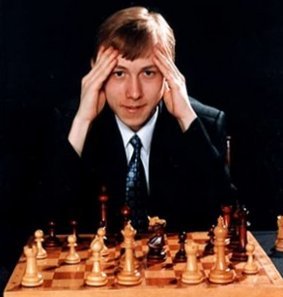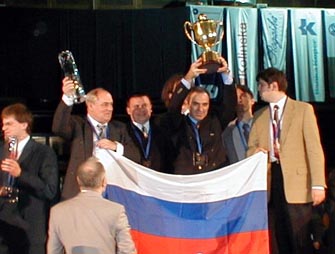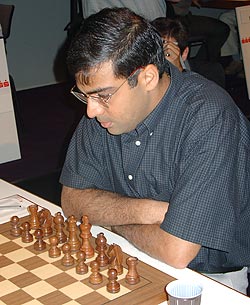 |
 |
 |
 |
 |
 |
 |
 |
 |
 |
 |
 |
 |
 |
 |
 |
 |
 |
 |
 |
 |
 |
 |
 |
 |
 |
 |
 |
 |
 |
 |
 |
 |
 |
|
|
|
|
|
|
|
|
|
|
|
|
|
|
|
|
|
|
|
|
|
|
|
|
|
|
|
|
|
|
|
|
|
|
|
|
 |
|
|
|
|
|
|
|
|
|
Drum Predictions for the 36th Olympiad
|
|
|
|
|
|
|
|
|
|

|
|

|
|

|
|

|
|
|
|
|
|
|
|
|
|
The 36th Olympiad will commence today and more than 100 nations will compete for honors. As in many sporting events, there are predictions made and below are some made for the upcoming battle! There are some marquee players missing which should make the tournament more interesting. Russia will not field Garry Kasparov or Vladimir Kramnik who are in the championship cycle for unification. However, Russia still touts the team with the highest average ELO with a stratospheric 2724! Notwithstanding, team events are more than just individual encounters on four boards… they are team events. Chemistry will be key. Here are the predictions!
|
|
|
|
|
|
|
|
|
|
|
|
|
|
|
|
|
|
|
|
Analysis: The youth movement in Ukraine is taking the country by storm and with players like Alexander Moiseenko (7-2 in Bled Olympiad), Andrei Volokitin, Sergei Karjakin, along with Ruslan Ponomariov, it is apparent that the future is in good hands. Combine the youth with the leadership of a World Champion contender like Vassily Ivanchuk and you have a recipe for success. Ponomariov's emergence signals a strategic gain for the Ukraine and whether he plays #1 or #2, he will need to score more than the 6-5 in Bled.
X-Factor: It is uncertain what strategy Ukraine will use for their top two boards. The other issue is whether Ivanchuk can repeat his excellent +4 performance as in 2002. The key to this team will be Ivanchuk's looming presence along with the vigor of Ponomariov, Moissenko and Volokitin. Ponomariov will be looking to prove himself once again after the World Championship debacle.
|
|
|
|
|
|
|
|
|

|
|
|
|
|
|
|
|
|
|
|
|
Ruslan Ponomariov has something to prove and this could be the perfect tournament to do it.
|
|
|
|
|
|
|
|
|
|
|
|
|
|
|
|
|
|
|
|
|
|
|
Analysis: It is hard to pick the Russian juggernaut as anything but a gold medallist even with only one of the "Killer K's." With the surging Alexander Morozevich and four-time Russian champion Peter Svidler, the Russians will certainly contend for the gold. With the other "Alexander the Great" in Grischuk and Alexey Dreev, any of top four boards could play board #1 without any significant loss in strength. In addition, Alexander Khalifman at board #5 has a higher ELO than the top players of nations such as Denmark (GM Peter-Heine Nielsen), Azerbaijan (GM Teimour Radjabov) and Slovenia (GM Alexander Beliavsky). This balance is key in a 14-round team tournament.
|
|
|
|
|
|
|
|
|
|

|
|
|
|
|
|
|
|
|
|
GM Garry Kasparov triumphantly hoisting the Gold Cup at the 2002 Olympiad. Can Russia repeat?
|
|
|
|
|
|
|
|
|
|
|
|
|
|
X-Factor: There are a number of questions to be answered. Who will provide the leadership… Morozevich on board #1? Perhaps it will be Peter Svidler. Kasparov's indomitable presence in 2002 was certainly a deciding factor in the race for the gold. Who will serve as the "clean-up" man? Will it be Grischuk who at board three is arguably stronger than most teams' board #1? One problem the top four Russian players in the past two years has been temporary bouts of inconsistency. Morozevich's near loss against Costa Rica's Ramirez in the Bled Olympiad has not been forgotten (53.Re6!) and Dreev was outclassed by IMs in Mexico. However, if Morozevich can continue his blistering play, Russia will be hard to beat.
|
|
|
|
|
|
|
|
|
|
|
|
|
|
|
|
|
|
|
|
Analysis: India's chances to medal in this tournament are excellent. With the tournament's strongest player on board #1, "It changes everything" as Garry Kasparov stated recently. Viswanathan Anand will have adequate protection from those powerful teams trying to draw on board #1 and win on the rest. This strategy will not be wise as Krishan Saskiran will be highly motivated and Pentala Harikrishna will continue his ambitious play. Surya Ganguly could have a break-out tournament as well. This nation is building a chess powerhouse and within 5-7 years could be the world's preeminent power. In fact, it would not be totally surprising if they won the gold medal.
X-Factor: The issue here will be how well the young players react to playing with Anand on board #1. While Anand has very good relations with the other players, his presence can either provide a boost of confidence or make them tentative about their own performance. This chemistry will be interesting to notice.
|
|
|
|
|
|
|
|

|
|
|
|
|
|
|
|
|
|
|
|
GM Viswanathan Anand
(Photo by Olena Boytson)
|
|
|
|
|
|
|
|
|
|
|
|
|
|
|
|
|
|
4. Armenia - Bronze medal winners in 2002, Vladimir Akopian will man top board and the former World Junior champion Levon Aronian will hold the 2nd table. Up-and-coming Gabriel Sargissian will provide a boost as a reserve in this solid lineup. Akopian will be protected by a crafty veteran in Rafael Vaganian and reliable warrior in Smbat Lputian.
5. Israel - With Emil Sutovsky, Boris Gelfand and Ilya Smirin manning the top three boards, the Russian Israelis will vie for a medal under no uncertain terms. However, in order to win a medal, they will have to put friendships aside and avoid 25-minute draws on all boards as seen during a crucial round in the 2002 Olympiad.
6. Netherlands - A solid top four anchored by the veteran, Jan Timman. Loek van Wely will be protected by the strong middle lineup of Ivan Sokolov and Sergei Tiviakov. Tiviakov will have to pick up points in crucial stages. These players play hard and will win points with their fighting spirit.
7. Spain - There is something to be said about "home-field advantage," but this team will be fortunate if they finish in the top 10. With a formidable force on board #1 in Alexei Shirov and a young star like Francisco Vallejo-Pons on board #2, Spain should make waves early in the tournament. The x-factor is whether they can maintain it, or go the route of Cuba and India in Bled and fade toward the end.
8. Azerbaijan - Teimour Radjabov and Shakhriyar Mamedyrov will lead a team of five teenage GMs. Mamedyrov will be the key if Radjabov is not in form. This team could perhaps have the best chemistry of any top-10 team and will boast an admirable swagger of confidence.
9. England - Hopefully, Nigel Short has figured out this brisk time control or opposing teams will just draw Michael Adams and play on Short's weak handling of the clock. Short has spoken out against these time controls and was victimized in the FIDE Championships. Luke McShane is going to be important to England's success.
10. Cuba - Maybe we are in for a surprise here. The rise of Lenier Dominguez and Lázaro Bruzón has given an otherwise aging team a big boost. Throw in another young talented reserve in IM Yuniesky Quesada and Cuba will have a lot of motivated players. Cuba competed for the early lead in Bled before losing several matches by lopsided scores (Poland 3-1, Israel 3-1, Sweden 3-1, Armenia 3½-½) in the middle rounds.
|
|
|
|
|
|
|
|
|
|

|
|

|
|

|
|

|
|
|
|
|
|
|
|
|
|
Other Observations
U.S.A. - This Russian American team will place Onischuk on board #1 leaving Shabalov on board #2 (contrary to original postings). Alexander Onischuk will provide stability on board #1, while Alexander Shabalov will fight hard and play aggressively in crucial rounds. After the first two boards, results may be uncertain. Kaidanov did not fare well in Bled on board #1, but he could play a key role in the U.S. resurgence. The issue is whether the reserve players (Igor Novikov and Boris Gulko) will have enough motivation when asked to score against strong teams. Both are hard to beat, but are far too content with draws.
Hungary - Without Peter Leko and Judit Polgar, Hungary cannot hope to better or equal their 2nd place finish in the 2002 campaign. Ferenc Berkes is a bright addition to the silver-medal team in Bled, but this squad bears only a figment of their strength from Bled.
France - Without Etienne Bacrot, the French team is severely weakened. Lineup of Joel Lautier and Etienne Bacrot would have been a powerful duo. Hopefully, Lautier can concentrate on playing chess as opposed to his ACP Presidential duties. Laurent Fressinet has looked strong in the past year and may serve as good complement for Lautier.
China - After a 5th place finish in Bled, the Dragons are not at their strongest point. Their hottest player Ni Hua is not on the roster and Zhang Zhong has tumbled below 2600. Bu Xiangzhi seems to have stagnated since breaking the record for becoming the world's youngest GM. However, the may be Bu's time to shine and dispel questions about his true strength.
Regional Predictions
Top African Teams - (1) South Africa (2) Tunisia (3) Morocco
Top Asian Teams - (1) India (2) China (3) Vietnam, Philippines (tie)
Top Caribbean Teams - (1) Cuba (2) Barbados (3) Jamaica
Top Latin American Teams - (1) Brazil (2) Argentina (3) Chile
Top Middle Eastern Teams - (1) Israel (2) Iran (3) Turkey
Players to watch
GM Andrei Volokitin (UKR), GM Alexander Grischuk (RUS), GM Levon Aronian (ARM), GM Gabriel Sargissian (ARM), GM Pentala Harikrishna (IND), GM Shakhriyar Mamedyrov (AZE), GM Luke McShane (ENG), GM Magnus Carlsen (NOR), GM-elect Mark Paragua (PHI), IM Watu Kobese (RSA), IM Kevin Denny (BAR)
Posted by The Chess Drum: 13 October 2004
|
|
|
|
|
|
|
|
|
|
|
|
|
|
|
 |
|
|
|
 |
|
|
|
|
|
|
|
|
|
|
|
|
|
|
|
|
|
|
 |
|